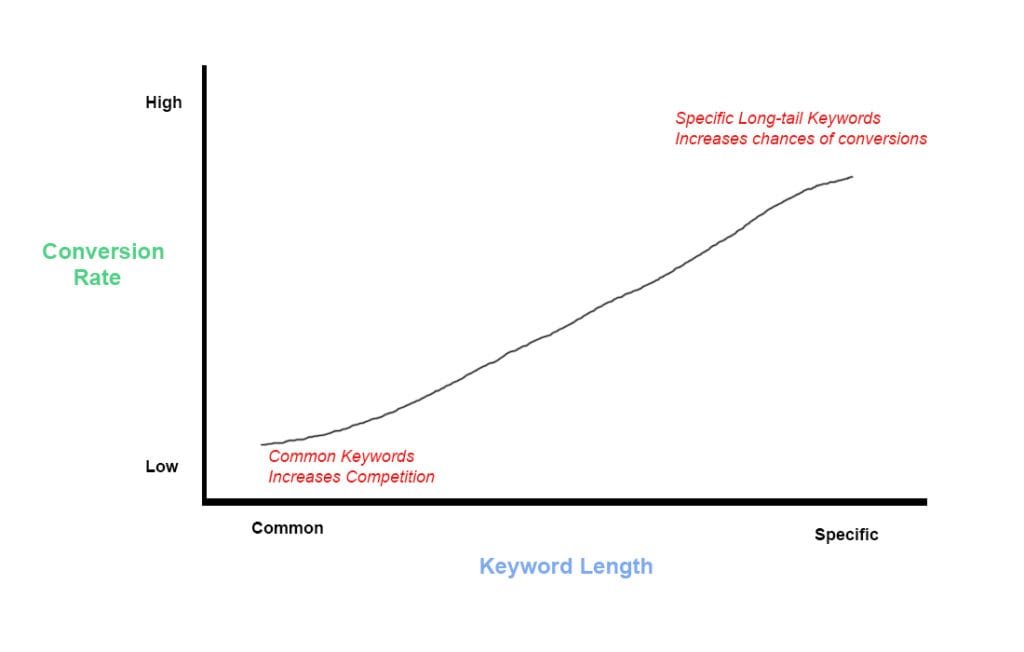Long-Tail Keywords – Their Importance and Tips to Find Them

Would you consider the use of long-tail keywords or the common keywords when blogging?
Ever since the reincarnation of SEO (which is a continuous process) masters are proclaiming that keywords are of no value. But, how could an element which is the backbone of any search result could die?
Keywords are here and will remain with us (at least for an unseen future). And in fact, SEO revisions are just making them stronger and more valuable. They’re no longer the eyeballs of web crawlers. They now are more inclined towards presenting a specific and quality result.
So, one thing is clear – keywords still serve their purpose. They are getting smarter.
Why Use Long-Tail Keywords?
Talking of keywords, this leads us to long-tail keywords. Long-tail keywords, as you’re already familiar with, are more accurate search terms and shows results which the searcher is really looking for. For example, if you’re a blogger and looking for tips to market your content, content marketing could be your primary keyword. But the results won’t be specific and it’d take a long time to get to the result you really are looking for.
On the other hand, if you try to be more specific you’d necessarily go for a long-tail keyword. Now try powerful forms of content marketing. This keyphrase would show you more specific, accurate, and few results, helping you find your desired tip.
This is how your long-tail keywords help you bring results you really want.
Machines Calling for Long-Tail Keywords
As of the advancements, there’s always something new coming in the market. Siri, Google, and Cortana are three such advanced intelligent personal assistants. You don’t need to type, just call them and ask for anything.
Using these apps is like talking to a human. You’ll get your results followed by a voice message. But just like typing a keyword, these intelligent personal assistants also need a long-tail keyword to help you provide specific results.
Long-tail keywords are not easy to find. It requires some research and purpose that serve. For this, you need to follow some below given steps:
Find Your Mission
Don’t take this lightly. The mission of your business, website, or blog should be very clear. What you’re offering to your audience, must be clear as glass. To help you find your mission, I have a list of questions which can help you understand the vision you need to start:
- How could your products or services help people?
- Why your products/services differ from your competitors?
- Could your products/services bring a change in your clients?
- What the secondary goal of your business is?
Once this is clear, it would be a lot easy to find long-tail keywords.
Find Your Competitors
Using long-tail keywords reduces the number of competitive results. But it will not completely eliminate them. For this, you need to find your competitors also.
If you’re an online business, it’s quite easy. You’d Google your products/services you’re (or will be) offering. From this, you can learn what they are offering, how their products/services if different from your, and what you are missing.
Once you find answers to these, it makes you once step ahead.
Find Your Audience
This is a tricky question. Your mission is all based on a group of audience. But this mission will not be enough for everyone from that particular group of audience.
Let’s understand this with an example. Say if you’re an online clothing store. Your mission is clear – selling clothes to online buyers. But are your clothes for every online buyer?
There is a thin line that distinguishes your mission from your audience. Don’t jumble up these terms.
Let’s find ways to find YOUR targeted audience. Ask yourself the below questions:
- What are you offering to your online clients?
- Understand the demography of the audience who might take an interest in your services/products
- Who’d afford your services/products?
Answers to these questions would help narrow down your target audience and so will help you find the search terms they’re or could be using.
Conclusion
No matter what experts suggest, long-tail keywords are still valid. You just need to find:
- Your mission;
- Your competitors; and
- Your audience;
To help get a list of long-tail keywords.
- Use of these keywords helps you in:
- Ranking higher in search results; and
- Increases the conversion rate;
So, do focus on a long-tail keyword when blogging but don’t forget the quality of your content.
Digital marketing enthusiast and industry professional in Digital technologies, Technology News, Mobile phones, software, gadgets with vast experience in the tech industry, I have a keen interest in technology, News breaking.












